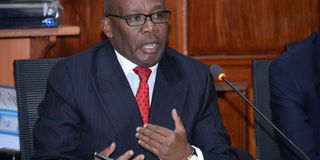Graft purge on course, says Githu

The Attorney General Githu Muigai. FILE PHOTO | SALATON NJAU | NATION MEDIA GROUP
What you need to know:
- President Kenyatta last week suspended Ethics and Anti-Corruption Commission chairman Mumo Matemu and his deputy, Ms Irene Keino, and formed a tribunal to investigate them after Parliament approved a petition seeking their removal.
- Even as the AG sought to assure the public that all was well at the commission, Law Society of Kenya chairman Eric Mutua yesterday said prime corruption suspects could take advantage of the situation to evade prosecution.
- He said the establishment of the International Organised Crime Division in the Judiciary was not meant to bring the ICC cases home, but to help in the war against global crimes such as money laundering, drug trafficking and poaching.
The suspension of anti-corruption chiefs and the appointment of a tribunal to investigate them will not affect the Ethics commission’s work, Attorney-General Githu Muigai has said.
President Kenyatta last week suspended Ethics and Anti-Corruption Commission chairman Mumo Matemu and his deputy, Ms Irene Keino, and formed a tribunal to investigate them after Parliament approved a petition seeking their removal.
There have been concerns that the absence of the two commissioners could hinder the progress of ongoing investigations by the commission. Prof Muigai yesterday dismissed the concerns, saying the officials’ suspension had not created any gap in the commission.
“The EACC is a body corporate. It is not made up of one commissioner or two but of several individuals,” he told journalists at Riara University in Nairobi after the opening of a symposium on impunity and the prosecution of international crimes.
He said the commission had in excess of 50 lawyers running its affairs. “There is a CEO and the commission is in office and functional. It is delivering files to the DPP.”
The Commission for the Implementation of the Constitution had warned that the anti-corruption agency could not perform some of its functions following the suspensions.
Even as the AG sought to assure the public that all was well at the commission, Law Society of Kenya chairman Eric Mutua yesterday said prime corruption suspects could take advantage of the situation to evade prosecution.
He said the work of the commission was affected and chances were that some people could use that loophole to challenge investigations.
“There are certain things the secretariat can do and there are others it cannot do according to the law.
“Investigations that had been authorised by the commission can be undertaken by the secretariat... but overall, the operations at the EACC have been affected,” Mr Mutua said.
However, Prof Muigai said he had been assisting the commission’s secretariat on legal issues. “I have been receiving legal requests for advice from them for some technical issues and wrote back to them in the normal way,” he said.
Former Kenya Anti-Corruption Commission director Aaron Ringera had also expressed reservations about the commission’s status.
Meanwhile, the AG took issue with commentaries that the government had frustrated the Kenyan cases at the International Criminal Court.
He said Kenya was supporting the African Court of Justice not to weaken the ICC but to strengthen the legal system for the benefit of Africans.
“Kenya is a founding member of the ICC and was among the very first countries to ratify and domesticate the treaty.
“We have cooperated with the ICC in its prosecution of the cases because it is our obligation under the Constitution and the Laws of Kenya to do so.”
He said the establishment of the International Organised Crime Division in the Judiciary was not meant to bring the ICC cases home, but to help in the war against global crimes such as money laundering, drug trafficking and poaching.
“It was the initiative of the Kenya Government to approach the CJ and JSC to create a division that would help to process cases that would help the International Criminal Court.”




